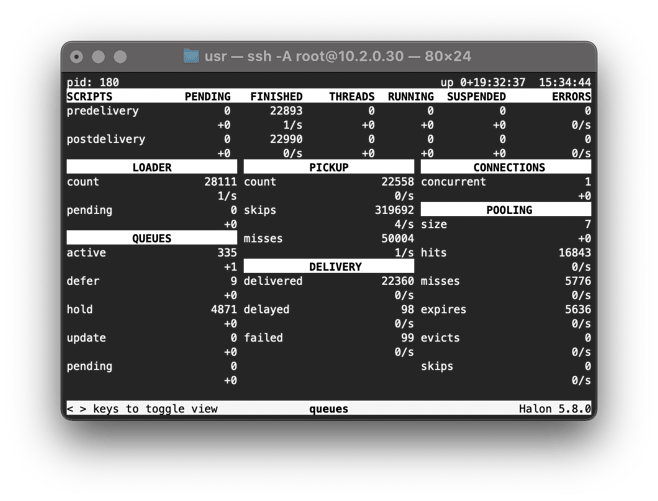The snow is deep, Christmas is just around the corner, and so is our next quarterly Halon MTA release 5.8 codename “packy”. It comes packed with improvements for both senders and mailbox providers; most notable around packaging and container orchestration readiness with for example Docker and Kubernetes.
It all starts with added componentisation aided by our new RPM and APT/deb repositories. The MTA and its different components can now be installed and scaled separately. There is no need for a 1:1 mapping between for example MTA and rate limiting or content filtering instances. Communication between components is designed to work with the dynamic scaling of Kubernetes. In order to get started quickly, we provide templates for Docker and Kubernetes. The new repositories also includes pre-compiled plugins from the extension library for quick and easy installation. This is the natural evolution of the previous release’s DevOps orchestration focus, allowing you to deploy and scale Halon MTA in a way that is just as flexible and modular as the software itself. The result is a more economical and scalable deployment that can respond to changing demands instantaneously.
Our large-scale senders will appreciate our new performance-optimised HTTP submission API. It’s ideal for injecting pre-formatted RFC822 messages directly into the end-of-DATA script hook. It’s configured just like SMTP endpoints, and accepts options in JSON format:
$ curl --request POST \
--header "X-API-Key: badsecret" \
--form "options=@sample.json;type=application/json" \
--form "rfc822=@sample.eml;type=message/rfc822" \
https://mta.hostname:443/v1/submissionSpeaking of sending performance; now that DKIM signing with EdDSA (ed25519) is becoming more popular, we’ve added capabilities for faster dual signing using the additional_signatures options to signDKIM(). Halon is one of very few to offer this optimisation, which provides a significant boost for one of the most CPU-intensive parts of email delivery.
The native plugin (C ABI) system has received many additions. We’ve added APIs for creating Halon script classes/objects, throw Halon script exceptions, executing Halon script callback functions and two new functions for encoding/decoding JSON directly from Halon script variables. You can see many of those new APIs hard at work in the halon-extra extension library on Github.
As usual, the release comes with tons of other improvements. It’s now possible to configure multiple queue spool paths, which can be useful when scaling queue storage performance in certain environments. The active queue policies have received multiple updates, including a shortcut for creating lists of items (like domains) in order to avoid repetition, as well as the ability to pass properties from matching policies to the post-delivery script which is useful when creating custom backoff rules. Analysing realtime process metrics and tuning performance-related settings is now easier with the halontop command.

We hope that you will enjoy this new quarterly release. Don’t hesitate to reach out if you have any questions or want to learn more about what we do!